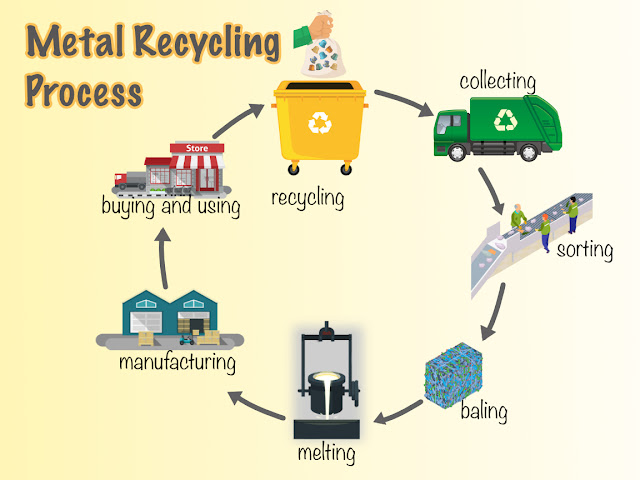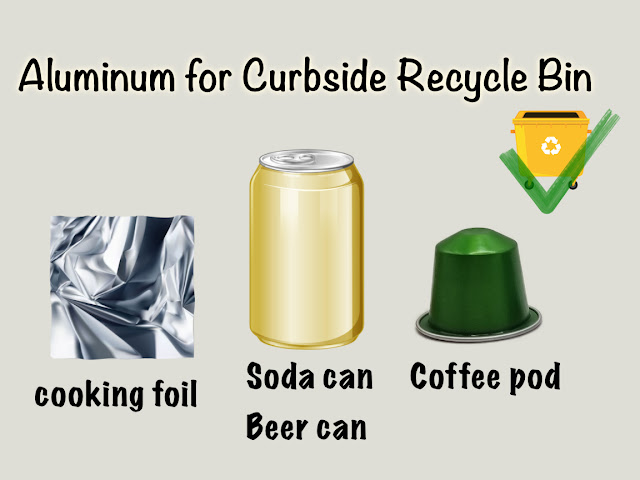Metal recycling reduces carbon footprint and is also a profitable business. Metal can be recycled infinitely without losing its quality whereas producing new metal from virgin resources requires so much energy, and the process emits a great amount of carbon. From mining, extraction, transportation, smelt and manufacture all depend on fossil fuel.
Using recycled metal is able to save the energy up to 60% compared to using virgin materials. By recycling one soda can, you can save the energy to power a TV for three hours. By recycling metals, we also can depend less on mining activities and preserve the resources and nature for future generations. Mining , when mismanaged, could damage the environment. Unfortunately, this is what’s happening in many countries and damages nature and leaves the soil and groundwater being polluted.
The process of metal recycling is similar to plastic recycling. First, metal waste gets collected, sorted, cleaned, crushed and baled, melted and purified, and sold to the manufacturer to make new products.
This recycling business model has been running successfully for decades. People also get paid by recycling metal. There are deposit programs for recycling soda cans. If you take unwanted metal things to a scrap yard nearby, you can earn some money too. You are also using recycled metal without being aware of that. For example, a soda can , after being recycled, can be made back to the shelf within 6 months, Nespresso also takes back 30% of their coffee pods and makes new pods with recycled aluminum. However, we could do even better by increasing the recycling rate, and recycle metals smartly.
Most metal wastes are valuable to recycling facilities. But to reduce confusion, when you have metal wastes, first, sort them. There are a few different types of metal we use in daily life. Most common metals we see everyday are aluminum, steel, stainless steel and cast iron. Usually curbside recycling bins only take metal packaging like soda cans, tin cans and aluminum foil. Just make sure it’s clean. You can make foils a ball and toss it into curbside recycling bins. Other metal things are usually not accepted. For example, your frying pans and pots, metal coat hangers or knives, razors, metal cutlery, aerosol spray, tools, nails and screws , screw drivers are not acceptable to curbside recycling bins. Cables and household appliances, even having metal parts, are not acceptable, either. They are E-wastes.
Here are some metals things you are working with everyday:
1. Aluminum
Light and soft. Many coffee pods, beverage cans, beer cans, kitchen foils..
2. Steel
Steel is hard and heavier. It is an alloy of carbon and iron. Vegetable cans, soup cans, fruit cans. They are usually made from steel but sometimes aluminum. Both are recyclable.
3. Cast iron
Cast iron is iron with 2-4% carbon, examples are woks, waffle irons, dutch oven, pans, skillet, and many cookwares.
4 Stainless steel
Stainless steel is a steel alloy composed of iron, carbon chromium and small amounts of other metals. Examples are pots and frying pans, knives, scissors, nail clips, many tools, and razor blades.
Except for tin cans and beverage cans, other metal wastes, you can take them to the scrapyard and you can make some money. Here are some useful tips before you take off:
1. If you don’t have access to curbside recycling, take all your metal wastes, including metal packaging to scrap yard
Not all metal wastes are accepted to curbside recycling bins. Unless it’s specified, curbside recycling bins only accept metal packaging such as tin cans, soda cans and foils. Coffee pods, made of aluminum too but they are so small that they are likely to be stuck in the belt of the recycling center. Ask your local government if coffee pods are accepted to curbside recycling bins or not.
Other common household metal wastes, like coat hangers, sports gear, pots and pan, decoration and trollers shouldn’t be disposed of in a curbside recycling bin. They need to go to a scrap yard. You can also bring the soda cans, clean coffee pods and tin cans to the scrap yard.
2. Clean the food residues
Before you go to the scrap yard, make sure your recyclates are clean without food residues. No one wants to handle rotten foods. Scrap yards may reject your metal wastes if they are contaminated with food residues.
Quickly rinse the soda can and tin can. If you have coffee pods, open them and remove the coffee grounds. There are several helpful tools, like coffee out, cafemesy, PodCut etc.
3. Sort your metal wastes
Before you go to the scrap yard, use a magnet to sort metal wastes into ferrous and non ferrous metals. Usually non ferrous has a better price than ferrous metal. If you put everything together, the scrap yard will offer you the lowest price.
In short, metal is valuable for recycling facilities. Curbside recycling services only accept metal packaging like soda cans and tin cans. Other metal things, like pans and pots, coat hangers, cutleries and knives are not acceptable to curbside recycling bins. You need to bring them to the scrap yard or find a specialist recycling program. Just make sure the waste is clean and sorted. Scrap yards may pay you some money. Aluminum Coffee pods may not be accepted to curbside recycle bins, but you can mail them back to Nespresso. If you remove the coffee grounds before you put them in the Nespresso recycling bag, you can recycle without worrying moldy pods stacking at home.











0 Comments